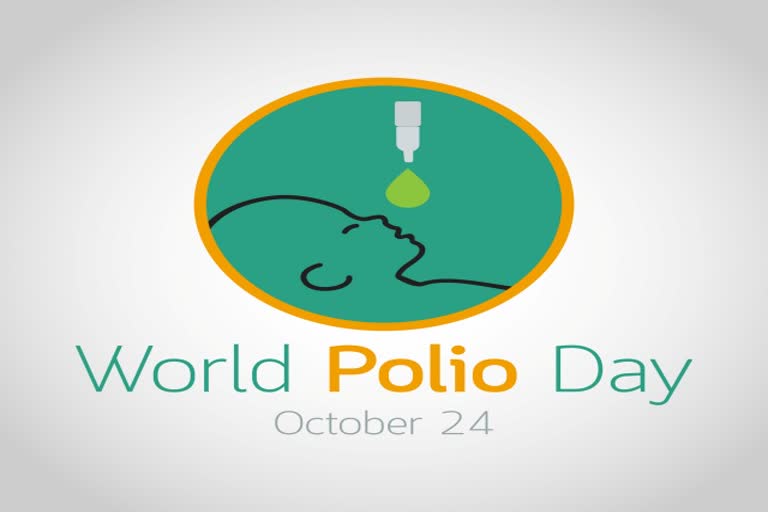Poliomyelitis or simply Polio, a highly infectious fatal disease, had been a major cause of concern for a long time, all around the world, until a vaccine was developed and the number of cases of people suffering from polio came down to zero in the majority of the countries. Therefore, to commemorate the birth of Jonas Salk, an American virologist and researcher, who along with his team successfully developed the first polio vaccine, every year on 24th October, World Polio Day is observed. It was first established by Rotary International. The day raises awareness about the disease and also acknowledges the contribution of people worldwide, who have helped eradicate it.
Polio Status Today
The World Health Organization (WHO) states, “Wild poliovirus cases have decreased by over 99% since 1988, from an estimated 350 000 cases in more than 125 endemic countries then, to 33 reported cases in 2018. Of the 3 strains of wild poliovirus (type 1, type 2, and type 3), wild poliovirus type 2 was eradicated in 1999 and no case of wild poliovirus type 3 has been found since the last reported case in Nigeria in November 2012”.
On 27th March 2014, India, along with the entire South-East Asian Region was announced polio-free by the WHO.
What Is Polio?
WHO explains that Poliomyelitis (polio) is a highly infectious viral disease that largely affects children under 5 years of age. The virus is transmitted by person-to-person spread mainly through the faecal-oral route or, less frequently, by a common vehicle (e.g. contaminated water or food) and multiplies in the intestine, from where it can invade the nervous system and cause paralysis.
How It Spreads?
The virus is present either in a person’s throat or intestines. Being a contagious disease, polio virus can spread through person-to-person contact. The Centers for Disease Control and Prevention (CDC) states the following ways in which the virus can be transmitted:
- Contact with the feces (poop) of an infected person.
- Droplets from a sneeze or cough of an infected person (less common).
You can get infected with poliovirus if:
- You have feces on your hands, and you touch your mouth.
- You put in your mouth objects like toys that are contaminated with feces.
Who Can Infect?
According to the CDC, An infected person may spread the virus to others immediately before and up to 2 weeks after symptoms appear.
- The virus can live in an infected person’s feces for many weeks. It can contaminate food and water in unsanitary conditions.
- People who don’t have symptoms can still pass the virus to others and make them sick.
What Are The Symptoms?
Symptoms of polio depend upon the severity of the virus in a person. Most people don’t have any visible symptoms, however, most people may present flu-like symptoms. CDC mentions the following symptoms:
- Sore throat
- Fever
- Tiredness
- Nausea
- Headache
- Stomach pain
These symptoms usually last 2 to 5 days, then go away on their own. A smaller proportion of people with poliovirus infection will develop other, more serious symptoms that affect the brain and spinal cord:
- Paresthesia (feeling of pins and needles in the legs)
- Meningitis (infection of the covering of the spinal cord and/or brain) occurs in about 1 out of 25 people with poliovirus infection
- Paralysis (can’t move parts of the body) or weakness in the arms, legs, or both, occurs in about 1 out of 200 people with poliovirus infection
“Paralysis is the most severe symptom associated with polio, because it can lead to permanent disability and death”.
Is There A Treatment?
“There is no cure for polio, it can only be prevented. Polio vaccine, given multiple times, can protect a child for life” states WHO. Therefore, the best way to prevent polio is to ensure that every child in the world gets vaccinated. The most common vaccine used is the Oral poliovirus vaccine (OPV).
The National Health Portal (NHP) of India mentions that OPV is given orally as birth dose for institutional deliveries, then primary three doses at 6, 10 & 14 weeks and one booster dose at 16-24 months of age. Apart from this, Injectable Polio Vaccine (IPV) is introduced as an additional dose along with 3rd dose of DPT (diphtheria, pertussis and tetanus) under Universal Immunization Programme.
Therefore, although we have eradicated polio to a great extent around the world, polio vaccination is a must for every new born baby, since there is no curative treatment available of this fatal disease. One needs to be cautious unless it is eradicated completely.



